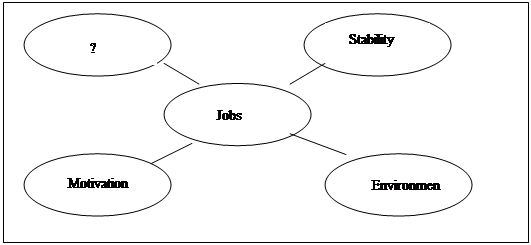题目内容
Most people seem to be passive at work. They do what they are told to do, and they don’t do what they are not told to do. In the end, one thing results: unmotivated (不积极的) people.
We’re employed to think. In fact, no matter how many times our bosses disagree with us, it is our responsibility to think for the company. There are lots of times when I disagree with my boss, and sometimes we even end up having arguments; however, I still offer my suggestions whenever I don’t agree.
Spending more time thinking also helps us to be more efficient (高效的) and helps to reduce our chances of frustration (挫败). Before I do something, I usually need some time to think about it to make sure that what I’m doing makes sense. This can be as long as a few days when a project is big, or as short as only a few seconds for a simple task. After thinking about a project, it sometimes becomes clear that a simple task could achieve the same result. In those cases, not only did I save myself from possible frustration, but I also felt happy and satisfied that I saved valuable resources for my company.
With so many people not taking time to think, it’s no wonder that many people are unmotivated. Today, I encourage you to think things over whenever you have a chance. At first, it might take a while, but once it becomes a habit, you will feel more motivated as you will be more valuable to the company.
73. It is suggested in the passage that people should _____.
A. stop arguing with their bosses B. seize every chance they meet
C. present views to their companies D. avoid big projects
74. According to the passage, spending more time thinking _________.
A. is a waste of time and resources B. can help people understand what others do
C. can help people impress their companies D. is a good way to improve efficiency
75. The author wrote this passage to ________.
A. persuade people to do what they are not told to do
B. encourage people to be more motivated
C. show people how to give different opinions
D. tell people how to form good thinking habits
【小题1】C
【小题2】D
【小题3】C

 单元期中期末卷系列答案
单元期中期末卷系列答案Farming was once the chief way of life in nearly every country. People cannot live without food, and nearly all their food comes from crops and animals raised on farms. Not many people farm for a living any more, but farming remains the most important work in the world.
Before the nineteenth century, the typical American family lived on a small farm. They raised pigs, cattle, sheep, chickens, and planted corn, frui ts, garden vegetables, and wheat. Everyone worked long and hard, but the results were often poor. Families barely harvested enough food for themselves. This situation began to change during the last half of the 1800's and it changed remarkably(明显地) in the next century.
ts, garden vegetables, and wheat. Everyone worked long and hard, but the results were often poor. Families barely harvested enough food for themselves. This situation began to change during the last half of the 1800's and it changed remarkably(明显地) in the next century.
Scientific methods and labor-saving machinery have made farming increasingly productive. The development of improved plant varieties and fertilizers has helped double and even triple the production of some major crops. More scientific animal care and animal raising have helped increase the amount of meat and products that animals produce. At the same time, the use of tractors and other modern farm equipment has sharply reduced the need for farm labor.
As farming has become less important as a way of life in the United States, it has become more important as a source which offers materials to industry. Today's successful farmers are experts not just in agriculture but also in accounting, marketing, and finance. Farms that are not run in a similar way have great difficulty surviving.
not run in a similar way have great difficulty surviving.
【小题1】 We are told in the first paragraph about ____.
| A.the history of farming | B.the importance of farming |
| C.the development of farming | D.the changes of farming |
| A.Farmers didn’t work hard on their farms. |
| B.Farmers used tractors to help them. |
| C.Farming was the main way of living for most people. |
| D.Farmers could supply materials to industry. |
| A.scientific methods | B.labor- saving machinery |
| C.farmers’ hard work | D.chemical fertilizers |
| A.the advantages of American farming | B.the changes in American farming |
| C.the situation of American farms | D.how rapidly farming has developed |
 it but later found it made you feel very uncomfortable over time? When you select your career, there’s whole lot more to it than assessing your skills and matching them with a particular position. If you ignore your personality, it will hurt you long-term regardless of your skills or the job's pay. There are several areas of your personality that you need to consider to help you find a good job. Here are a few of those main areas:
it but later found it made you feel very uncomfortable over time? When you select your career, there’s whole lot more to it than assessing your skills and matching them with a particular position. If you ignore your personality, it will hurt you long-term regardless of your skills or the job's pay. There are several areas of your personality that you need to consider to help you find a good job. Here are a few of those main areas: 
 right hand, and in many countries and regions in Europe some people still follow this tradition.
right hand, and in many countries and regions in Europe some people still follow this tradition. .You can have an inscription put on the inside the band.
.You can have an inscription put on the inside the band.